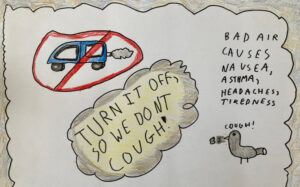Scientists from the University of Reading are to work with Reading Borough Council to deliver an interactive education programme in local primary and secondary schools to raise awareness about air quality.
 Over three million children across the UK are exposed to harmful levels of air pollution each school day, with those in the South East at particular risk. Air pollution can cause severe health problems, including asthma, slower development of lung function, wheezing and coughing, as well as mental health issues and obesity.
Over three million children across the UK are exposed to harmful levels of air pollution each school day, with those in the South East at particular risk. Air pollution can cause severe health problems, including asthma, slower development of lung function, wheezing and coughing, as well as mental health issues and obesity.
The Citizen Science for Cleaner Air project was launched at the University thanks to a grant of £5,000 over two years from the Community Fund – a joint initiative between the John Sykes Foundation and the University of Reading, offering financial support to projects that benefit the people and the community of Reading. Researchers at the University worked with four Reading primary schools to tackle pollution at a local level, helping children play and learn in cleaner, safer spaces. The project made the invisible visible, mapping pollution hotspots on children’s journeys to and from school.
And now this scheme is being built upon with Reading Borough Council (RBC) being awarded £327,000 as part of a successful bid for a share of £10.7 million funding for local authorities to improve air quality. The money, from the Government’s annual Air Quality Grant, aims to help councils develop and implement measures to benefit schools, businesses and communities and to reduce the impact of air pollution on people’s health.
Professor Hong Yang, project partner from the University of Reading, said: “We’ve already utilised state-of-the-art sensors to assess air quality in and around four schools in Reading. This new DEFRA project presents a great opportunity to collaborate with RBC, schools, and other partners to work on air quality in more schools.
“Our aim is to raise the public’s awareness about the damaging effects of air pollution on the health of children, parents and teachers, and inspire communities to make more effective changes that will result in cleaner air and a reduced carbon footprint in schools and the surrounding areas.”
The next stage
RBC now plans to work in partnership with the University to deliver the project, by engaging with children and parents from at least 33 schools across Reading. The programme will deliver focused activities to increase awareness and encourage behaviour change.
The new initiative will build Key Stage (KS) lesson plans, assemblies and activity days and workshops; as part of term length programmes to be delivered to schools. This could include involving the children in data gathering using sensors to determine ‘What is the air quality like around your school, on the way to school, around your home?’
The main aims of the project will be to:
- Increase knowledge of poor air quality, its causes, impacts and solutions, for primary and secondary school children, via a range of age suitable activities
- Increase awareness of air quality in the wider community, including schools outside of the project, parents, and the communities around these schools
- Encourage behavioural change in activities that impact on poor air quality by parents and the wider community, and promote measures that school children, and others, can take to reduce their exposure to poor air quality.
The project will aim to begin working with schools from September 2023.
Marta O’Brien, air quality researcher and project partner from the University of Reading, said: “Finding ways of protecting children from exposure to air pollution is an important part of our research. This means additional work is needed to understand where and how we can apply measures to reduce spikes of dangerous pollutants, especially at the school gates.
“Collaboration with RBC and other project partners means that our existing work can expand and reach more schools, children, and families.”
Councillor Tony Page, Reading’s Lead Councillor for Climate Strategy and Transport, said: “Securing this funding is great news for our schools and for helping to improve Reading’s environment. This will enable us to reach our younger generation and encourage them to be active and passionate ambassadors for the ways we can all help improve air quality.
“We are fully committed to maintaining and improving air quality across the town as we work towards our ambition of a net-zero carbon Reading by 2030. This educational initiative forms part of our wider work to encourage behaviour change.”






